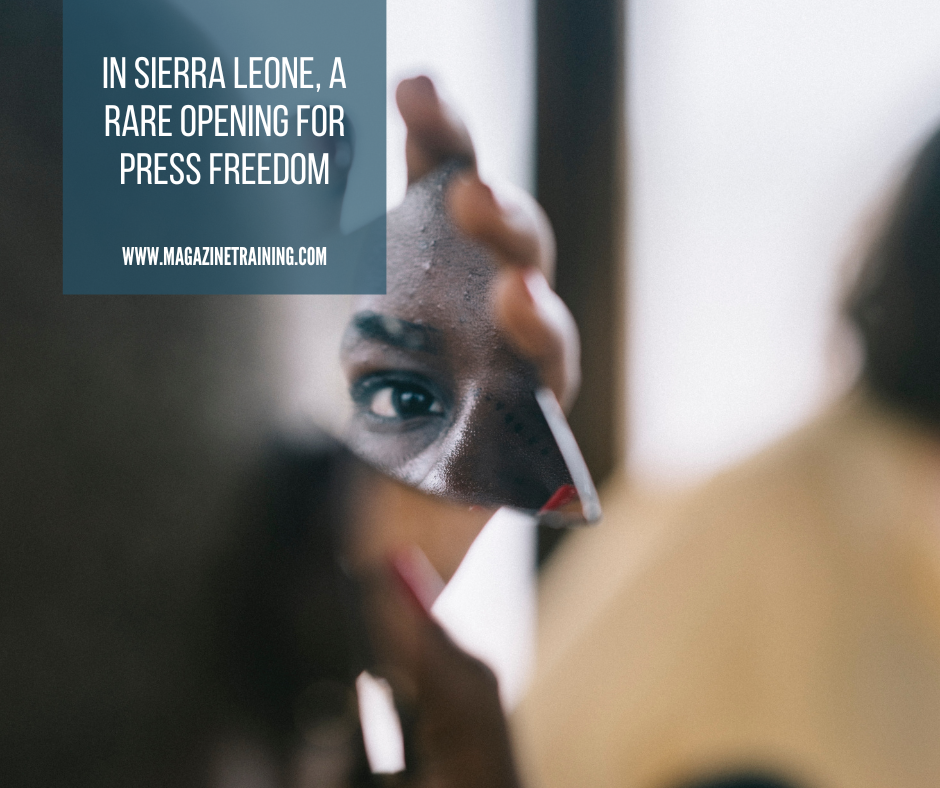
Amid the spread of disinformation-fueled “opinion media” in democratic societies, and government censorship and propaganda in autocracies, press freedom is declining globally.
Sierra Leone, however, is moving in the other direction. The West African nation rose 29 places in Reporters Without Borders (RSF)’s 2022 press freedom rankings, to 46th globally — comparable to Uruguay, South Korea and the U.S.
The country’s rapid rise against the current global trends comes in the aftermath of a repeal of its 1965 Criminal and Seditious Libel Law, which had been used to repress journalists critical of the government.
“A year on from signing the repeal, 130 registered newspapers, 165 registered radio stations and 42 registered television stations continue to operate freely,” said President Dr. Julius Maada Bio at a press conference last year.
Today, “there is no journalist in prison for the practice of journalism,” he said.
A rare bright spot in a time of declining press freedom, Sierra Leone offers a potential model for media, civil society and reform-minded governments in other countries to improve the state of independent media.
Repealing an anti-press law
In 1991, Sierra Leone descended into a brutal civil war, as the Liberia-based Revolutionary Action Front attempted to overthrow the government. The war lasted 11 years, reaching a momentary resolution with the signing of a peace agreement— the Lomé Peace Accords — in 1999. However, hostilities continued, and the British military intervened in 2000, spending two tumultuous years securing the government from rising rebel groups.
Formal elections were finally held in 2002, after which newly elected President Ahmad Tejan Kabbah declared an official end to the civil war. Following the conflict, a truth and reconciliation commission was established to address the causes and effects of the war and create a plan of action for the future.
Among the recommendations: repealing the 1965 libel law, which had contributed to a culture of corruption and fear.
“The nature of the law was so terrible that the publisher could get arrested, the editor could get arrested, the reporter and sometimes even the boss reading it,” said Mohammad Swaray, Sierra Leone’s Minister of Telecommunication, who guided the repeal.
Despite the recommendation, the libel law wasn’t repealed at the time, and those in power continued to use it to harass and imprison journalists. The 2018 election of President Bio, previously a head of state in the civil-war era military government, presented the first administration with a policy platform of repealing the law.
“Apart from the Reconciliation Commission, successive National Human Rights Commission reports have noted that [the libel law] was not the model of good governance, press freedom and democracy,” said Swaray. “Number one was to bring our laws in line with other international treaties that we were a signatory to. We wanted to be good competitors. We want to be a compliant nation.” He noted, too, that while the libel law was in place people were arrested and businesses closed down. “It’s not the most enabling environment to attract investment. We argued that as well [to parliament],” he said.
by Devin Windelspecht and Ume A. Sarfaraz, International Journalists’ Network
Photo by Random Institute on Unsplash
Related posts
Magazine Training International’s mission is to encourage, strengthen, and provide training and resources to Christian magazine publishers as they seek to build the church and reach their societies for Christ.

